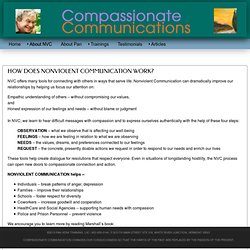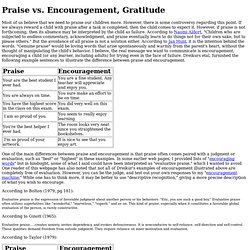

A scientific guide to saying "no": How to avoid temptation and distraction. 2K Flares Filament.io 2K Flares × Learning how to say no is one of the most useful skills you can develop I found, especially when it comes to living a more productive and healthy life.

Don’t Get Defensive: Communication Tips for the Vigilant - Mark Goulston. By Mark Goulston | 12:00 PM November 15, 2013 When we get defensive, we make it that much harder for our conversational counterparts to hear what we’re saying.

We also make it harder to really listen to what *they* have to say. Soon, we’re shadow-boxing, defending ourselves against attacks that aren’t real, and wasting energy — and relationship capital — on damage control instead of solving the problem at hand. If you get hooked into defensiveness — and most of us do — you probably already know it. It’s likely come up in conversations with your boss or your spouse. Well, I’ll tell you. The One Conversational Tool That Will Make You Better At Absolutely Everything. Ask yourself: If you could interview like Walter Cronkite, would you get more value from your meetings? Would your mentors become more valuable? Would your chance encounters with executives in elevators and thought leaders in conferences yield action items and relationships?
The answer is yes. “As someone who had little to no experience in business--outside of running my own one-man freelancing operation--all that's really saved me (so far) from madness are the skills I used as a journalist,” says Evan Ratliff, who wrote for magazines like The New Yorker before founding his startup, The Atavist. One of those skills, he says, is “being able to formulate questions that deliver useful answers, whether from advisors or clients or whomever.”
Nonviolent Communication Training Course - Marshall Rosenberg - Session 1 - CNVC.org. Nonviolent Communication Part 1 Marshall Rosenberg. 6 Words to Drop From Your Vocabulary. HOW DOES NONVIOLENT COMMUNICATION WORK? NVC offers many tools for connecting with others in ways that serve life.

Nonviolent Communication can dramatically improve our relationships by helping us focus our attention on: Empathic understanding of others – without compromising our values, and Honest expression of our feelings and needs – without blame or judgment. How to Talk About Sensitive Topics so That People Will Listen. 7 Things Really Amazing Communicators Do. Praise versus Encouragement. Most of us believe that we need to praise our children more.

However, there is some controversy regarding this point. If we always reward a child with praise after a task is completed, then the child comes to expect it. However, if praise is not forthcoming, then its absence may be interpreted by the child as failure. According to Naomi Aldort, "Children who are subjected to endless commentary, acknowledgment, and praise eventually learn to do things not for their own sake, but to please others.
" But the avoidance of all praise is not a solution either. One of the main differences between praise and encouragement is that praise often comes paired with a judgment or evaluation, such as "best" or "highest" in these examples. According to Bolton (1979, pg 181): Evaluative praise is the expression of favorable judgment about another person or his behaviors: "Eric, you are such a good boy. " FBI Secrets of Establishing Rapport: Interview with FBI Veteran Robin Dreeke. Even if you’re the biggest introvert in the world, Robin Dreeke can get you to talk. As a 15-year FBI veteran and lead trainer for social engineering and interpersonal skills at the agency, Dreeke is a master of establishing rapport with just about anyone, and that includes the IT guy who never looks up from his keyboard.
As head of the Behavioral Analysis Program, Dreeke often is asked by companies to help their leaders better communicate with their teams and increase collaboration . Dreeke says he finds the best way to establish rapport with others is by asking himself, “What do I want the other people to tell me or do for me, for the team or for the company?”
Then he contemplates this question: “Why should they do it?” “In other words, not why I think they should, but why they think they should. That’s a formula any leader can use and is critical because it’s focused on developing trust, he says. AB: So what’s the fallout from such a strategy? 6 hostage negotiation techniques that will get you what you want. How does hostage negotiation get people to change their minds?

The Behavioral Change Stairway Model was developed by the FBI’s hostage negotiation unit, and it shows the 5 steps to getting someone else to see your point of view and change what they’re doing. 6 Exercises To Strengthen Compassionate Leadership. Disney has been known for its litigious nature in the past, going so far as to change copyright law in order to keep Mickey Mouse out of public domain.
That's why it's kind of weird that a movie filmed at Disney World, unapproved by the Mouse House, even exists at all. After making a splash at Sundance this year, though, the intriguing Escape From Tomorrow appears to be heading for a theatrical release--and the first trailer is now online. First-time director Randy Moore shot the film at the Florida theme park, guerrilla-style, over a series of visits with his crew and an unknown cast. Details of the terms Moore worked out with Disney remain under wraps for now, but the controversial matter seems to be settled. While the circumstances surrounding Escape's production have dominated the conversation thus far, with the release of this trailer, perhaps talk will shift to the movie itself.